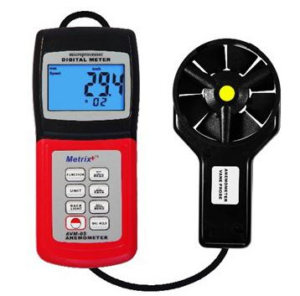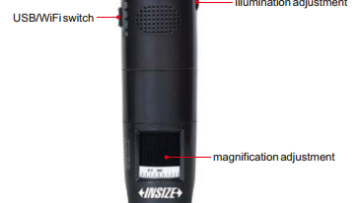Measuring principle
The digital anemometer measures wind speed by measuring the speed of the fan(vane), whose axis is parallel to wind direction, using a revolution counter and converting it into readable format.
Applications
An anemometer is a device used for measuring wind speed with additional features of wind direction, temperature and relative humidity. It is a common instrument in weather stations, metrological departments and checking air conditioning and heating systems.
Features
- Built in temperature measurement.
- A sensitive balance vane wheel rotates freely in response to air flow.
- Reading convertible to different measurement units.
- Data memory for storing and recalling values later.
- Data hold and auto power off.
- Backlit display.
Technical Specifications
| Model | Metrix+ AVM 05 | ||
| Display | 13mm(0.5”) 4-digit Backlit LCD | ||
| Measuring range Wind speed | Range | Resolution | Accuracy |
| 0.4 ~ 45 m/s | 0.1 | +(2%n + 0.1d) | |
| 1.4 ~ 162 km/h | 0.1 | +(2%n +0 .1d) | |
| 80 ~ 8860 ft/min | 1 | +(2%n + 1d) | |
| 0.8 ~ 88 knots | 0.1 | +(2%n + 0.1d) | |
| Air temperature | 0 ~ 60°C (32 ~ 140°F) | 0.1 °C/°F | 0.5°C / 0.9°F |
| Air flow | 0 ~ 9999 CMM/ CFM | 0.001 ~ 1 | +(2%n + 1d) |
| Beaufort Scale | 0 ~ 12 | 0.1 | +0.5 |
| Wave height | 0 ~ 14m | 0.1 | +0.1 |
| Measurement units |
Wind speed: m/s, km/h, ft/min, knots Air flow: CMM(m3/min), CFM(ft3/min); Beaufort scale: Force Wave height: m; Air temperature: °C/ °F |
||
| Data memory | 24 groups | ||
| Sampling rate | approx 1 reading per second | ||
| Sensors |
Air velocity/ flow sensor: Conventional angled vane arms with low friction ball bearing Temperature sensor: Precision thermistor |
||
| Operating conditions | 0 ~ 50°C; <80% RH | ||
| Power supply | 4 x 1.5V AAA (UM 4) | ||
| Size |
Main unit: 156 x 67 x 28mm Sensor head: 72mm diameter |
||
| Weight | 260g (excluding batteries) | ||
| Standard accessories | Main instrument with sensor, instruction manual, batteries; gift box packing | ||
| Optional accessories | PC interface for data logging | ||



